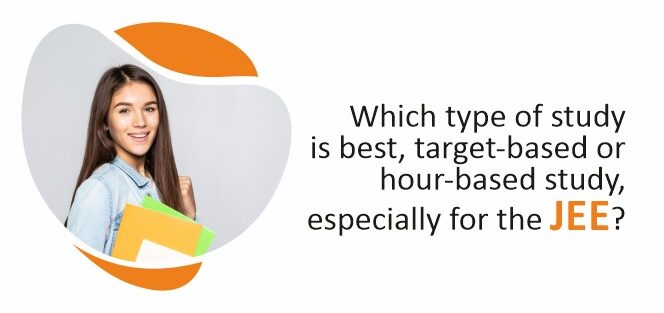
17 Feb Which Type Of Study Is Best, Target-based Or Hour-based Study, Especially For The Jee?
The Joint Entrance Examination (JEE) is a highly competitive exam for admission into engineering colleges in India. Aspiring engineers need to prepare well in advance to score well in the JEE exam.
One of the most common questions among JEE aspirants to make the Best JEE study schedule is whether they should follow a target-based or hour-based study approach. Here are the advantages and disadvantages of both types of study methods that help you determine which one is best for you.
Target-Based Study-
The target-based study involves setting a specific goal or target to achieve in a certain amount of time. For example, a JEE aspirant may set a target to complete a certain number of chapters in a particular subject in a week or aim to solve a certain number of problems each day.
Advantages-
- It provides a clear focus and direction for your studies.
- It helps you stay motivated and on track toward your goals.
- It helps you measure your progress and identify areas that need improvement.
Hour-based study–
The hour-based study involves dedicating a certain number of hours each day to studying, regardless of the specific tasks you want to achieve during that time. For example, a JEE aspirant may commit to studying for 6 hours every day, and use that time to cover the topics they need to work on, revise, or solve practice problems.
Advantages-
- It provides flexibility in terms of what you study and how much you study.
- It allows for more revision time, which is critical for success in the JEE exam.
Which is Best for JEE?
The Best JEE study schedule for JEE depends on your learning style, goals, and preferences. Some students may find that a target-based approach works best for them, while others may prefer an hour-based approach. In general, a combination of both approaches may be the most effective.
Some tips to help you determine which study approach is best for you:
- Identify your learning style: Consider your strengths and weaknesses, and how you learn best. If you are a visual learner, you may prefer to use diagrams, videos, and animations. If you are an auditory learner, you may choose to use podcasts, lectures, and discussions.
- Set specific goals: Regardless of whether you choose a target-based or hour-based approach, it is essential to set specific goals to help you stay focused and motivated. For example, you may set a goal to complete a certain number of chapters in a particular subject by a certain date.
Prioritize revision: Revision is critical for the success of JEE Exam Preparation. Make sure to dedicate sufficient time for revision, regardless of your chosen study approach.
- Use a variety of study resources: Use a variety of study resources, such as textbooks, online resources, practice tests, and coaching classes to help you prepare for the JEE exam.
- Take breaks: Taking breaks is important to avoid burnout and maintain focus. Make sure to schedule breaks in your study schedule and use that time to relax, exercise, or pursue hobbies.
How Soham’s IIT helps you?
Soham’s IIT has experienced faculty members who are well-versed in the JEE syllabus and exam pattern. They help students in JEE Exam Preparation and can provide valuable insights and tips on how to study or make a schedule to crack the exam. Students can clarify their doubts on various topics with their teachers. This can help students to understand the concepts better and overcome their weaknesses.
Soham’s IIT follows a structured approach to learning, which helps students to cover the entire syllabus systematically. The coaching classes usually have a well-designed study plan, which helps students to prioritize topics based on their importance.




No Comments